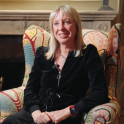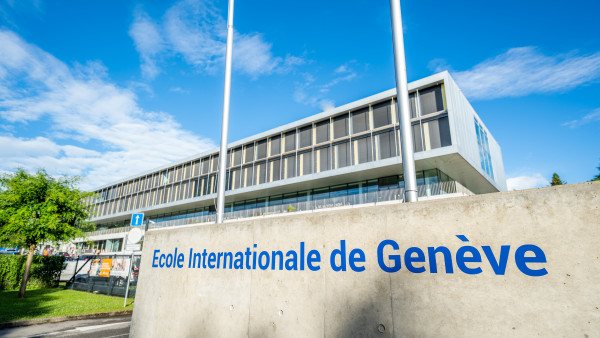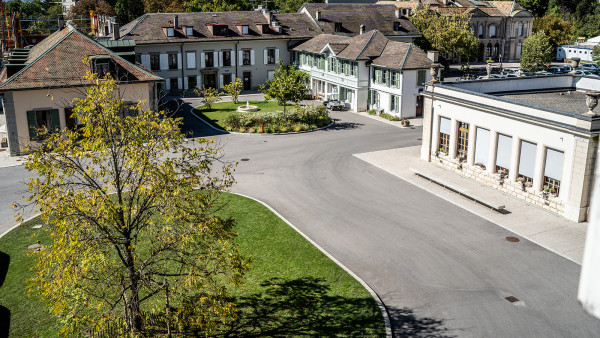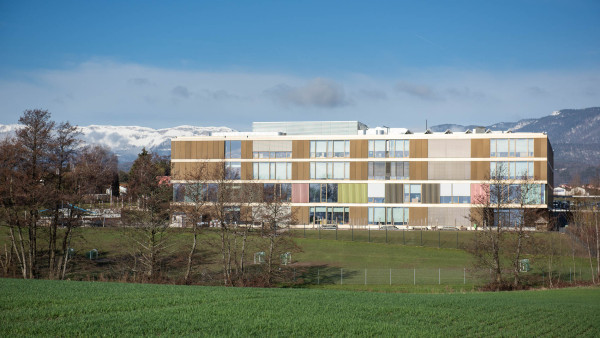For many parents, the Geneva English School evokes strong loyalty as they see their children thrive in a beautiful setting with a dedicated teaching staff striving for excellence in the educational, social, cultural and physical development of their children. GES is a community marked by its happy children who are self-disciplined with high moral values - values they take with them for the rest of their lives.
Why read our school review?
Unlike other websites, schools can't pay to be included in The Good Schools Guide. This means our review of this school is independent, critical and fair, and written with parents' best interests at heart.
Overview
- Student numbers
- 310
- Curricula
- British
- SEN provision
- SEN considered case by case
- Pre school provision (up to 4)
- Yes
- Religion
- Non-denominational
- Fees
- CHF 19,000 to CHF 35,800 5% sibling discount
- Ownership
- Privately owned as Geneva English School SA
Head of school
Director general
Christina Matillon
Since May 2024, Christina Matillon. Previously director of marketing and head of secondary admissions. Formerly school principal at British School of Geneva.
Entrance
There are no academic hurdles by way of exams or prerequisites, but there is an English fluency requirement. A waiting list operates, with preference given to siblings or alumni families. Students who attend GES are usually keen and motivated.
Exit
In 2025, popular UK university destinations included University of Cambridge, King's College London, Imperial College London, University College London, University of St Andrews, Durham University, and others. In Switzerland: ETH Zürich, University of St Gallen and University of Geneva. In the rest of Europe: Ecole Polytechnique (Paris), Bocconi University (Milan), IE Business School (Madrid) and others. On other continents: Concordia University (Canada), Villanova University (USA) and UNAM (Mexico) to name a few.
Some students head off to top British public schools at age 13, often winning scholarships. However, most of the students stay on to attend the secondary school for the IGCSE/A level combination. For those wanting IB, Ecolint continues to be a popular choice though there are other options in the Geneva area and in the neighbouring canton of Vaud, including Swiss schools that offer the IBDP or even the French Baccalaureate or Swiss Maturité.
Latest results
In 2025, 70 per cent of IGCSE grades were 9-7. At A level, 26 per cent A*/A.
2024 and 2023 exam results were not made available by the school.
Teaching & learning
The primary objective of the school is to offer the best modern British education for children from age 3-18 living in or around Geneva, and to prepare them for higher education. The school can also prepare students for UK boarding schools (11+ and 13+ exams) and some students do leave at age 11 to attend other local international schools.
The primary school does not slavishly follow the English national curriculum. Rather, it extends it to take in local aspects such as language learning, taking real advantage of a rich international education and its Swiss location.
There are no Sats here (thank goodness, say many parents), but teachers closely monitor children's academic progress. Staff pride themselves on adapting the curriculum to be more international, which does give the school one of its unique points - maintaining the flexibility to incorporate the best of all educational practices. It also means that they can teach rather than constantly practice for tests.
In primary school there is a strong emphasis on literacy and numeracy, and later science, as well as French language and technology skills such as robotics and coding. A high standard of work is both expected and achieved. On our visit, everyone was beavering away at their desks or otherwise actively engaged and very happy to be doing so. There was lots of laughter to be heard.
The teaching staff consists of over 16 experienced and fully qualified British teachers, supplemented by four French teachers and six part-time class assistants (some of whom have had specialist SEN training) plus a specialist director of inclusion. They are enthusiastic, dedicated and well-liked and respected by the parents. Maximum class sizes are 20 pupils in reception and 22 in the other years, with three classes per year across up to year 4 and two classes per year in years 5 and 6.
In secondary school students follow a traditional British curriculum preparing for I/GCSE exams. The recent introduction of A levels is a huge benefit to the local and international community as it offers students, who might struggle with the broad IB Diploma or even broader French Baccalaureate and Suisse Maturité curricula, the opportunity to specialise in three subjects that they enjoy and are good at.
Secondary school's location in an office block (not so unusual among international schools in Switzerland) means that this is not a traditional secondary school experience but smaller class sizes (currently around 20 students) and just two classes per year group allows for a very individual learning environment.
On our visit, everyone was beavering away at their desks or otherwise actively engaged and very happy to be doing so
- Curricula & qualifications
- British - National Curriculum for England
- British - A levels
- British - GCSE (General Certificate of Secondary Education)
Learning support & SEN
There is a fully qualified director of SEN and a number of class assistants have had specialist SEN training to help those students with minor to moderate learning disabilities. Students are supported within the classroom whenever possible with dedicated learning assistants and booster sessions on offer for those who need further support. Some students may receive one-to-one help for speech and language support.
Language support
As the head makes clear, this is a school for English mother tongue or students who are fluent in English, however there is EAL support in both primary and secondary with dedicated coordinators and lessons. The newly introduced - and already popular - language academy offers classes for children in the local system to need to brush up their English skills.
Arts & extracurricular
This is a family school, with many opportunities for the community to gather for the different school shows, the Christmas and summer fairs, carol concert, ski competition or the spectacular sports day. Parents are very active participating in the events - it is an essential ingredient in the school’s family atmosphere. And many hours of hard work go into the school productions by staff and children of course.
Weekly assemblies are also a time when children can showcase work of exceptional quality as well as demonstrate their musical gifts - 30 to 40 music lessons take place in school each week. Throughout the year, the school benefits from a diverse range of visitors from the local police and fire brigade to authors and specialists in music and drama and visitors from CERN, the European organisation for nuclear research.
Art is an important part of the GES curriculum and, as usual with primary schools, the walls are adorned with pictures and paintings. The excellent art facilities at both primary and secondary schools allow for a wide range in the type of art and media the children can get involved with.
In primary school there is an extensive range of extracurricular activities that take place during lunchtimes and after school. Free activities include: choir, drama, art, cooking and chess. Paid for include: ballet, judo and golf.
In secondary school students also get the opportunity to do the Duke of Edinburgh International Award, the Sports Leadership Programme, Model United Nations (MUN) as well as debating, entrepreneurship, eco-club and robotics to name just a few.
There is an extremely well organised after-school care programme every day.
Parents are very active participating in the events - it is an essential ingredient in the school’s family atmosphere
Sport
Sport is taken seriously at GES. Football, rugby, basketball and netball teams all fielded in local school competitions and GES organises other interschool events including cross country and athletics. The extensive primary school grounds provide ample space for football and rugby during winter and cricket and rounders in the summer. There is a five a-side football pitch at the secondary school which doubles up as a basketball court. Ski camps are also available for older primary and secondary school students. Netball, a sport that is increasingly popular in Switzerland, is also played on the basketball court. A few table tennis tables also dotted around for enthusiastic players.
Ethos & heritage
The setting of the primary school is idyllic - a 19th century country house-style building situated on a large property a short drive from central Geneva. Walking around the immaculate, well-groomed campus, one could imagine a Jane Austen film being made here. A magnificent view of Lake Geneva and the French Alps beyond with Mont Blanc featured (on a clear day) makes for an unsurpassed setting for sports day each June. There is a large parking area where parents can be found chatting as they drop off their children each morning.
There are three additional buildings: the years 4-5 classroom block, a multi-purpose hall/gymnasium and the state-of-the art reception to year 3 building (which, in our view, is the ugliest of the additional buildings and does somewhat clash with the elegance of the main house). Everything is spotless in true Swiss style. Ample grounds surround the buildings for children to run and play, however, during the winter and if it is muddy, wet or raining, the grass is off limits for the children. Perhaps because they would damage the grass or more likely that they would track mud inside and dirty the shiny marble floors when they re-enter the buildings. An extensive playground with games painted on the ground encourages children to play some of the more traditional British games such as hopscotch.
The Geneva English School was founded in 1961 by a group of parents seeking primary education for their children based on the British curriculum, thereby avoiding disruption in their children's education when they returned to the United Kingdom or were sent to British boarding schools. Its role has changed over the years and a large majority of the children now stay on for secondary education in Geneva. From a school which originally started in a church hall with eight children from 5 to 7 years of age, the Geneva English School has now grown to around 200 primary pupils aged 3 to 11 and 140 secondary students.
Even with this growth the school has definitely not lost the intimate and close family atmosphere which is unique to GES. The sense of real community permeates everywhere at both GES primary and secondary campuses - though the atmosphere is very different at each as you might expect for different school stages.
The secondary school is located 3km away (just five minutes by car) in the neighbouring commune of Versoix. It is located on the right-hand side of a large office building. An architect specialising in school design was brought in to design the common areas, drama hall and classrooms resulting in a very homely feel to common areas and classrooms; both having break out areas for students to work in pairs or groups. It also has a small outdoor area for the students and the older ones are allowed to walk into Versoix or down to the lake (about 200m away) at lunchtimes. Parents can also drop-off in the underground carpark but no space to park and chat with other parents here as at the primary school.
A planned expansion of the school in summer of 2023, a purpose-built sports pitch and access the lake at lunchtime are putting to bed previous mutters about the lack of outside space. The five-year plan includes building a stand-alone secondary school, ideally closer to the primary.
Founded in
A magnificent view of Lake Geneva and the French Alps beyond with Mont Blanc featured (on a clear day) makes for an unsurpassed setting
Pastoral care, inclusivity & discipline
There are four houses: Rhone, Leman, Jura and Dole. This provides both a family feeling and a spirit of competition firmly built on teamwork as the school’s older children work with younger schoolmates from their house at events throughout the year.
Discipline is not a problem at this school, according to parents and pupils. The children live by school's core values (integrity, community, achievement, resilience and excellence) and the pastoral co-ordinator tracks both academic and personal progress.
Classroom & community
Established as a British school for the expat community in this very international city, the school is evolving with a more international demographic. Currently, the student body is about 40 per cent British, 25 per cent with a British or Commonwealth parent and 35 per cent from the rest of the world including local Swiss families. Parents are largely working professionals, many with one of the international companies or organisations based locally. Those parents who have come from London ‘hot-house’ schools will get a surprise - thankfully the academics are strong here without a pressurised atmosphere. Although all students learn French, which is a priority as it is the local Swiss language, But English is the language in the playground and the parking lot, and there is a very English feel to the school culturally.
Graduates reflect fondly on their days at GES; one told us she loved it and never had a day or time that she didn’t want to go. None of them want to leave when that day finally arrives at the end of year 6, even if they can now move onto the secondary school.
Parents are equally positive about the school and appreciate that there is discipline and academic achievement, built on a true sense of community and belonging. The children’s smiling eyes and eagerness to learn say it all. Lifetime friendships are made between parents, staff and pupils.
Those parents who have come from London ‘hot-house’ schools will get a surprise - thankfully the academics are strong here without a pressurised atmosphere
- School year
- August – June, with three terms
- School hours
- 8:30am – 3:30pm depending on year groups
- Student nationalities - total
- 60
- Uniform requirements
- No
Money matters
GES is privately owned as Geneva English School SA. There is a board of governors, half of which is made up of annually elected parents including the chairman, several external governors and the headmaster. There is no endowment as such and nor is support solicited from other organisations, which protects the autonomy of the school and allows it to create the environment it chooses. Fees are slightly lower than the surrounding international schools.
- Annual fee range
- CHF 19,000 to CHF 35,800 5% sibling discount
- Fee information
- Registration fee: CHF 1,500;
Capital development fee: CHF 4,000 (made up of two CHF 2,000 payments, one on joining and one a year later);
Tuition deposit: CHF 3,000. There are optional additional costs for lunch, transportation, residential trips and some extra-curricular activities.
The last word
For many parents, the Geneva English School evokes strong loyalty as they see their children thrive in a beautiful setting with a dedicated teaching staff striving for excellence in the educational, social, cultural and physical development of their children. GES is a community marked by its happy children who are self-disciplined with high moral values - values they take with them for the rest of their lives.
Accreditations, inspections & memberships
- Accreditations/Inspections
- Council of British International Schools (COBIS)
Independent Schools Inspectorate (ISI) (DfE BSO approved)
BSO (British Schools Overseas inspection programme)- Memberships
- AGBIS, AGEP, COBIS, ECS, FSEP, IAPS, SGIS.





